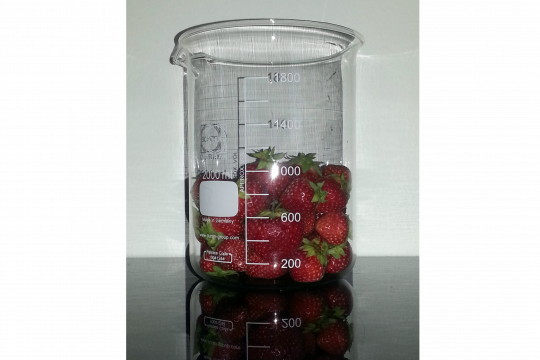Strawberry fields forever


Seldom does one find wild strawberries in amounts that allow you to pick liters, but this summer we did. I hope that genetic engineering will sooner or later bring back this amazing taste into the cultivated varieties, which have lost most of it over the centuries of breeding for size and appearance. When that happens, I suspect that GMO opponents will continue eating the conventional, GMO- and taste-free, but pestidicide-surcharged breeds (read more about GMO plants).
For now, we have to make do with the cultivated varieties. Cultivated strawberries are sold at the grocery store by weight, whereas on the market they are sold by the liter. Being frugal by nature, I never liked this as it makes comparing prices difficult. Assuming that strawberries can be approximated by equally sized spheres, the maximum theoretical packing density could be 0.74 kg per liter (using regular packing) and 0.63 kg per liter (using random packing). Assuming that strawberries can be squeezed a bit, these number could be slightly higher. However, this is again offset by the measuring jar’s small size, which leaves lots of slack space between the walls and the strawberries.
I bought a few times 1 liter of strawberries and measured their weight, which averaged at 0.517 kg. Now my thumb rule is that if the liter price it equal or less than half of the kilogram price, you should buy by the liter.
UPDATE: I measured now also blueberries and they (due to their smaller size) fill better the 1-liter jar used by the market vendors. I liter is approximately equal to 0.575 kg. Another take home message is that market vendors do usually give you a bit more. If you buy a liter you often get 1.05 or even 1.1 liters. Are they are generous or do they only respond to being watched by the customer during the process of weighing?



